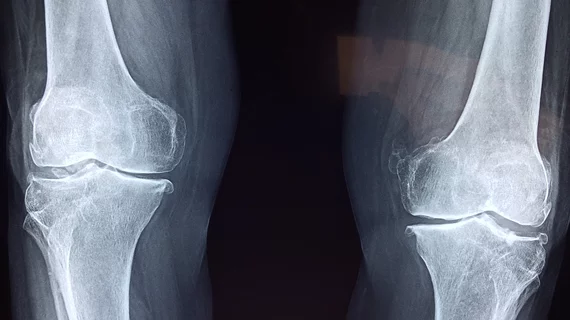AI model ‘cuts out the middleman’ to predict knee replacement risk from radiographs
More than half of the estimated 14 million Americans suffering from knee osteoarthritis will undergo a total knee replacement before they pass. And a new deep learning algorithm detailed Tuesday can better predict those who will need the procedure.
A team of imaging and data experts from New York University tested their artificial intelligence model on more than 700 patients and found their model bested traditional grading systems. With further research, the approach could help create disease-modifying therapies that prevent or delay the need for knee surgery, the group wrote June 23 in Radiology.
It may not be the first deep learning algorithm to make such predictions, but University of Washington, in Seattle, radiology professor, Michael L. Richardson, MD, suggests it may be the most efficient.
“Previous studies that used deep learning to assess OA of the knee focused on classifying knee radiographs into one of five Kellgren-Lawrence grades. The rationale was that these KL grades could then be used to predict a patient’s need for total knee replacement,” Richardson wrote in an editorial accompanying the study.
“However, [this] deep learning model… goes a step further, cuts out the middleman (KL classification) and predicts TKR need directly from the patients’ knee radiographs,” he added later.
The study included retrospective data from 728 participants who were involved in the multi-institutional Osteoarthritis Initiative, including x-rays and some MRIs. Each patient was matched to someone in the control group (324 individuals) according to age, sex, ethnicity and body mass index.
Overall, the deep learning model performed well, achieving an area under the receiver operating characteristic curve score of 0.87. This topped both conventional KL scoring and Osteoarthritis Research Society International grading systems.
Richardson noted that the model will need to be evaluated on external datasets before moving into real-world use, but called the results a “hopeful step” in the right direction.
“The availability of an automated system that could accurately predict TKR need has important and practical ramifications,” he wrote, pointing to the nearly 14 million Americans who have OA symptoms.
“There is therefore a great necessity to begin disease-modifying therapies as soon as possible to prevent or delay the need for a TKR,” he concluded.

